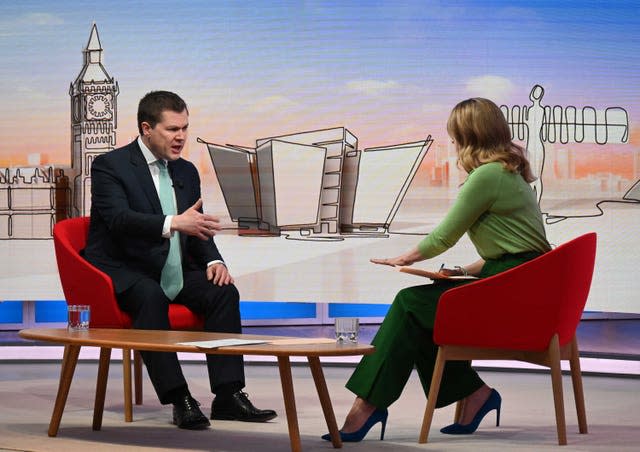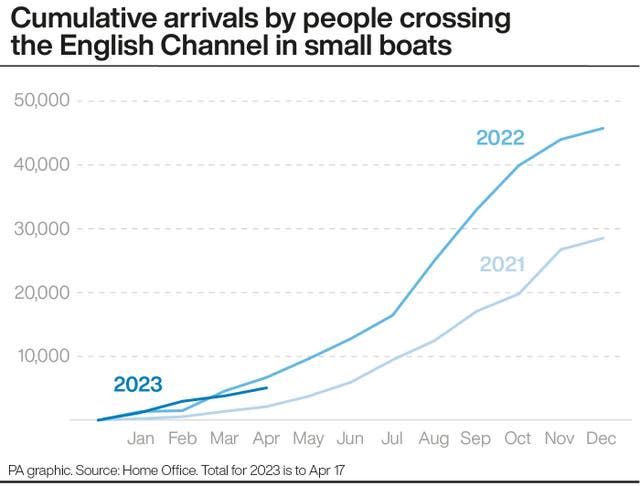Asylum system ‘riddled with abuse’ and needs fundamental change – Jenrick

The immigration minister has claimed the UK’s asylum system is “riddled with abuse” and revealed that migrants will be asked to share hotel rooms as the Government comes under pressure to reduce net migrations.
Robert Jenrick said a lot of progress has been made on illegal migration in a short period of time, with “really unique landmark deals” with France seeing a “big increase” in the number of interceptions on the beaches.
But he said the asylum system – which according to him has a backlog of more than 150,000 cases – must be changed “fundamentally”.
Meanwhile, the BBC reported that the Home Office estimates it will have to spend between £3 billion and £6 billion on detention facilities, accommodation costs and removals under the current plans to tackle small boat crossings.
Mr Jenrick told the BBC’s Sunday With Laura Kuenssberg programme: “The asylum system is riddled with abuse, we have to be honest with ourselves.
“The way to tackle that is by changing fundamentally the way we handle asylum.”

Mr Jenrick said the Illegal Migration Bill to detain migrants who arrive through unauthorised means before returning them home or to a third country, such as Rwanda, will alleviate the pressure.
“That will create the deterrent we desperately need, it will break the business model of the people smuggle gangs and it will stop the system from coming under intolerable pressure like it is today,” he said.
Mr Jenrick said he does not think it is unreasonable to ask asylum seekers to share rooms after a group this week apparently refused to enter a hotel in Pimlico, central London, where the Home Office had asked them to sleep “four people per room”.

In a letter to the Home Secretary, the leader of Westminster City Council expressed his “deep concern” that around 40 refugees were placed in the borough on Wednesday night “without appropriate accommodation or support available” and no prior communication with the local authority.
Speaking about the incident, Mr Jenrick told the BBC: “As I understand what happened here was that these migrants, who had themselves said that they were destitute, they had nowhere to stay, we had offered them a safe bed with board and lodgings in a good-quality hotel in central London.
“Yes, some of them had to share with other people. These are single adult males: I don’t think that’s unreasonable.
“We want to reduce the cost to the taxpayer. Some people said that wasn’t good enough and they wanted their own ensuite bedrooms, and the Home Office took the perfectly reasonable view that we’ve got to look after the taxpayer here.
“And if you’re genuinely destitute, of course you’d accept that, and common sense prevailed and, I think, almost all of the migrants in question accepted the accommodation.”

He denied it is Government policy to tell asylum seekers they have to share four to a room in hotels, but said it is “completely fair and reasonable” to ask single adult males to share a room.
“We don’t want to be using hotels at all. These are taking away valuable assets for the local business community, for society, you know, people’s weddings and personal events have had to be cancelled because of that.
“But where we are using them, it’s right that we get good value for money for the taxpayer.
“And so if single adult males can share a room, and it’s legal to do so, which will obviously depend on the size of the accommodation, then we’ll ask people to do that.
“I think that’s a completely fair and reasonable approach,” he told Kuenssberg.
Mr Jenrick said people arriving in small boats “risk cannibalising the compassion” of the UK public.
He also told Sophy Ridge On Sunday on Sky News that young men putting “overwhelming pressure” on the asylum system are making it harder for the country to support people who “genuinely need our help”.

Mr Jenrick told the programme that thousands of Albanians are returning to their home country.
He added: “There are hundreds of Albanians who’ve arrived on small boats who have been placed on those flights as a result of the processes we put in place and the agreements that we’ve reached with Albania.
“The reason that we are returning Albanians is to deter people from coming in the first place, and that is succeeding.”
He also said that migration targets are not “particularly helpful”, despite previous Tory promises.
Mr Jenrick told the BBC: “Net migration is far too high today.”
But asked about David Cameron’s 2010 pledge to reduce annual net migration below 100,000, Mr Jenrick said: “I don’t think that targets like that are particularly helpful because migration is an extremely challenging space where behaviours are constantly changing.”
Net migration to the UK is estimated to have reached a record 606,000 in 2022, up 24% from 488,000 in 2021, according to the Office for National Statistics.
Responding to Mr Jenrick’s comments, Enver Solomon, chief executive of the Refugee Council, said: “In the media today the Immigration Minister falsely claimed that most people arriving by boat are economic migrants and that the asylum system is ‘riddled with abuse’, when the truth is that the Government’s own statistics show this to be untrue, as the majority of people crossing the Channel to the UK are eventually shown to be refugees.
“In fact, three-quarters of asylum claims are granted protection at the initial decision stage.
“Instead of explaining away failures in the asylum system, it is essential for the Government to keep a sustained focus on fixing the problems within the UK asylum system, starting with real commitment and resourcing to tackling the asylum backlog of 170,000.”

 Yahoo News
Yahoo News 
